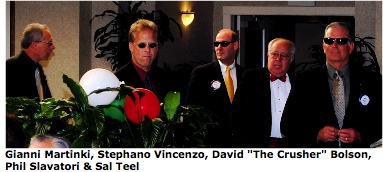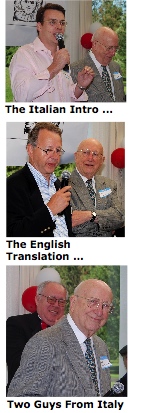|
|
||||||||||||||
|
||||||||||||||
“Welcome to Nono’s Italian Family Get Together”
Members of the BBRC were asked to arrive a little early Friday for a special meeting. It was special all right. At the door, everyone was frisked for “pieces” by the “enforcers": Gianni Martinki, Cristofano Ballard, Stephano Vincenzo, Sal Teel, Tomaso Harrelson, and David "The Crusher" Bolson.
When the spread was ready, the enforcers led the group through the buffet, which was a standard Italian dinner: antipasta, pasta, and carne courses. A few mentioned that it was odd eating a multi-course dinner at breakfast time, but for some reason, they left and weren’t seen again. Ever. At the appointed hour, the guest of honor was nowhere to be found, so Assistant Governor Steve Lingenbrink assumed control and started the meeting, only to be taken out and “persuaded” a bit by a couple of the enforcers. Gunshots were heard, and he was escorted back in a later a little worse for the wear. Meanwhile, Chefs Gianni DeWater and Stephano Goldfarbio tried to keep the buffet line in order, but when things got too hot to handle, Mamamia Margie arrived on the scene and threatened to strike them with her kitchen utensils unless decorum was restored. Then, with great fanfare, Da Godfodda, Phil Salvatori himself, entered the scene. Of course, he was accompanied by his retinue, including Angelo the Embezzler (Steve Szirmai), and Pope Rogerto (Roger Allington). Pope Rogerto gave the blessing and led the pledge; then Sister Maria Louisa (Bell), the “pregnant nun,” introduced visiting Rotarians and guests. Each guest was asked to confess to his or her biggest sin. The most common sin of all seemed to be sincere remorse for not making up at the BBRC more often. Classification Talk: Cristo Rasmussen As part of the ritual of transition from red to blue badge, each BBRC member must give a classification talk to the club. Friday was no different — we had the classification talk of Cristo Rasmussen of Palermo, Italy.
On the estate, Cristo learned to make only the finest wine — pink Franzia in a box. Eventually, his knees got store from grape stomping, so the family opened a night club, complete with dancers and greasy poles. Antonio Classico, the commissioner of police, didn’t like his daughter dancing, so the family nightclub got the squeeze from the cops, and eventually they had to leave town. Meanwhile, Phil “Sweat Feet” Salvatori had established himself as the best grape stomper. However, one day, he forgot the cardinal rule — he didn’t wash his feet — and put athlete’s foot into every bottle (or box) of wine in Palmero. He had to leave Italy to get as far away from Palmero as possible. He came to the United States and eventually settled in the Pacific Northwest. Now, he has a new family, the BBRC. In Rotary tradition, Gianni Martinki did computers for the world. There was an emergency in Village de la Salvatori. Like with Turkey, they had problems with customs. Customs? The locals assured them they had great customs. They had bigger problems, like not having electrical power in the schools. No problem, they had an Olympic cyclist — the only problem is that he had been disgraced in a doping scandal. OK, if you’re still reading this, you either are a sucker for completely senseless stories, or you have an incurable case of sick curiosity. Either way, rest assured that this week’s editor didn’t invent ANY of this stuff. He only recorded the absurd stories as they unfolded. Somehow, the mission of the team diverged, and it became pizza ovens for every school, since networking the computers was impossible because they had networking cable that was more like strings of linguine than Ethernet. Somehow, despite all the challenges, the team succeeded and they all lived happily ever after ... which led Phil to declare that all must have gelato misto for dessert. That was okay, but the Lemoncello that we were all forced to toast with after was a little over the top. As a result, those planters around the room at Glendale may, just may, have been irrigated with a liquid that was unfit for human — or plant — consumption. Don’t be surprised if the plants are all dead next time we meet there, which is NOT next week. Lou Guzzo Remembers Papa Lou Guzzo has been married 64 years. He is a former investigative reporter and editor for the Seattle PI and has been involved in Washington politics for decades. After retiring from Olympia, he spent 12 years with KIRO television. Lou’s speech was perfectly in step with the theme of the meeting. He spoke in detail of his rich Italian heritage growing up in “Little Italy” in Cleveland, Ohio. He opened with the remarks of another Italian American, whose name is forgotten: “I know that half of you are of Italian descent and are very proud, and the other half wish you were.” Lou was also quick to point out that there are a few historical Italians who weren’t the best role models: Caesar, Capone, Mussolini, and others who have brought discredit upon the Italian-American community. After introducing his background, Lou titled the rest of his speech, “I remember Papa” (with apologies to “I Remember Mama”). He made the bold claim that his dad was the greatest man who ever lived. His name was Frank Guzzo. Frank's papa had indentured him to a cruel uncle who was a priest. Frank saved up enough money to head for the nearest port. He found he could get into the US on a quota for immigrants, and in 1905, he came in through Ellis Island. He applied for US citizenship and took a class to learn the English language. Lou remarked, “Oh, how times have changed!” Frank got a job on the Pennsylvania railroad with lots of other Italian immigrants. Many Italians put the labor into the building that made America great. He was schooled as a master mechanic, and he spent his working career as a shop foreman in a tool and die company in east Cleveland. He loved America. He transferred that love and admiration to the children: he never missed an election day. By his example and goading, he embarrassed half the neighborhood into voting each election day. Frank always had a flag flying on the family home. He would correct anyone and straighten them out if they said bad things about America. Lou was born into that family and grew up in Cleveland’s Little Italy, and he didn’t leave until the second World War. All those years, he felt the influence of the Mafia, which constituted less than 1% of the population of Little Italy. Kids knew them and kept their distance. Lou relayed a few anecdotes about his experiences with the Mafia growing up. He clearly inherited the disdain his father showed for the group. One anecdote was particularly striking. One day, at age 11, he was walking to school. On the way, a black sedan passed him. Three men jumped out and opened fire with automatic weapons, fired into the restaurant and killed two men inside. Those slain men had given information to the police. The murderers were never apprehended. His father reminded him, “Keep your distance from the foul beasts.” Frank told him stories of the Mafiosi crimes in Italy and stressed that he wanted Lou to grow up to be a good Italian. Fear of the “ruffianis” ruled the roost. Now you know why he became a relentless crime investigator. In 1965, he began investigation of the policy of the corruption in the Seattle. Under the tolerance policy, police were getting payoffs for protection. Payoff money was handed upward to police officials and council members to the county prosecutor. Stan Pitkin (the federal prosecutor) took the lead in fighting the corruption. Overall 65 were indicted, but only two were convicted in trial. The rest got off because the court system was littered with judges who had been placed there by the prosecutor. Lou was disappointed they didn’t all get prison, but all the “scum” were thrown out of office. While the PI investigation was going on, he was the target of threats. When his editor asked him why he took the risks, he responded that he did it for the memory of his father. Lou is in the process of finishing his autobiography, which, by the small sampling of his talk on Friday, will certainly prove to be fascinating reading. The Bee's Bar Mitzvah Two bees met in a field. One said to the other, "How are things going?" "Really bad," said the second bee. "The weather has been cold, wet and damp, and there aren't any flowers, so I can't make honey." "No problem," said the first bee. "Just fly down five blocks and turn "Thanks for the tip," said the second bee, and flew away. A few hours later the two bees ran into each other again. The "Great!" said the second bee. "It was everything you said it would be. "Uh, what's that thing on your head?" asked the first bee. "That's my yarmulke," said the second bee. "I didn't want them to |
|
|||||||||||||


 The guests were individually escorted and seated family style at Ristorante Salvatori, and warned not to go through the line until the head cheese arrived.
The guests were individually escorted and seated family style at Ristorante Salvatori, and warned not to go through the line until the head cheese arrived.  Cristo was born in Palmero, Italy, at a very young age. He lived his youth on the Salvatori Estate with brothers Frankie, Rico, Sonny, and cousin Michael. Papa said the big Dane had to prove himself, so he went to work for the family. He learned to stomp grapes and over time, he developed his own moves. Later, MC Hammer gained fame after stealing some of these very moves from the big Dane.
Cristo was born in Palmero, Italy, at a very young age. He lived his youth on the Salvatori Estate with brothers Frankie, Rico, Sonny, and cousin Michael. Papa said the big Dane had to prove himself, so he went to work for the family. He learned to stomp grapes and over time, he developed his own moves. Later, MC Hammer gained fame after stealing some of these very moves from the big Dane.  Manfred Markevitch introduced guest speaker Lou Guzzo in perfect Italian. The problem is, nobody understood. Next, Bob Holert introduced the guest speaker by breaking the ice with a “Buenos Dias!”
Manfred Markevitch introduced guest speaker Lou Guzzo in perfect Italian. The problem is, nobody understood. Next, Bob Holert introduced the guest speaker by breaking the ice with a “Buenos Dias!” 

